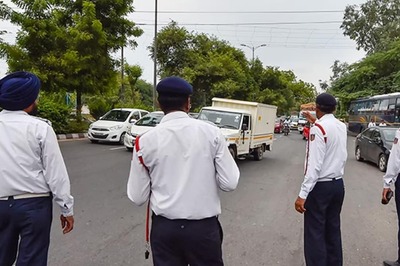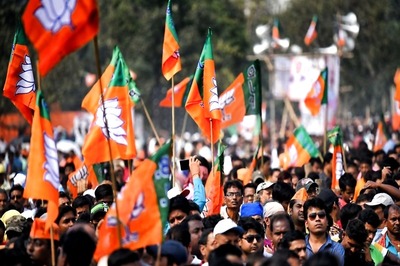
views
New Delhi: Prime Minister Manmohan Singh may not be aware of Anna Hazare's power to get his demands met through his "indefinite fasts". He should probably ask his cabinet colleagues Vilasrao Deshmukh or Sushil Kumar Shinde or even Shiv Sena MP Manohar Joshi.
All of them, as chief ministers of Maharashtra, had to bowed to Hazare's demands one time or another.
Till the 1990s, Hazare was known only as a social activist who transformed the village of Ralegaon Siddhi in Ahmednagar district of Maharashtra into a model village.
The village that faced water and power shortages was quickly transformed into a self sufficient village after Hazare convinced the people to dig canals to store and retain rain water.
Tree plantations were done and the village got power through solar power and biogas. As the story of the village's transformation spread, Hazare started getting noticed.
His transformation into an anti-corruption crusader began in 1995 when he took on the then Shiv Sena-BJP government in Maharashtra.
He went on an indefinite fast demanding removal of three ministers - Shashikant Sutar, Mahadeo Shivankar and Baban Gholap.
Anna refused to end the fast and the government had to let go of Sutar and Shivankar. However, Gholap sued him for defamation. Hazare had claimed that Gholap had amassed huge amount of wealth disproportionate to his known sources of income.
He had also alleged that Gholap was facing an inquiry by the ACB. Hazare could not produce proof following which he was sentenced to three months jail. However, the then chief minister, Manohar Joshi, had Hazare set free after a day’s imprisonment.
An inquiry commission later cleared Sutar and Shivankar of the charges. This did not deter Hazare from levelling corruption charges against others including Manohar Joshi, Gopinath Munde and Nitin Gadkari. He, however, withdrew the allegations.
The Congress and the NCP, too, have been affected by Hazare’s actions. In 2003, Congress and NCP ministers had to resign after he went on a hunger strike against four "corrupt" ministers - Sureshdada Jain, Nawab Malik, Vijay Kumar Gavit and Padamsinh Patil.
The government set up an inquiry commission. Jain resigned after being indicted by the commission. Malik also stepped down. This catapulted Hazare to the big stage.
From then, Hazare and his fast became a potent weapon, which, many politicians and political analysts say, has been misused.
"The problem with Hazare is he believes whatever he says should be treated as gospel truth. According to him, if he makes a demand than just by the virtue of his words, the government should accept it," said political analyst Pratab Asbe.
In 2000, a sustained campaign by Hazare forced the Maharashtra government to pass the Maharashtra Right to Information Act 2000.




















Comments
0 comment